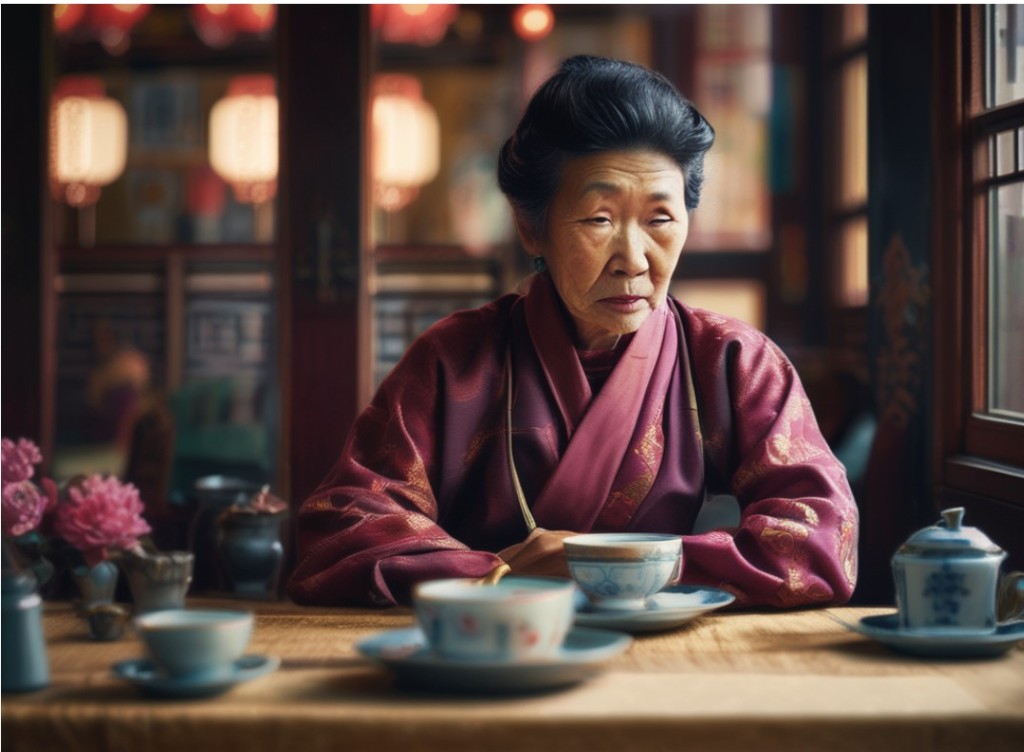
Have you ever come across a book that is just as enjoyable as a freshly made cup of tea? Now, let me introduce you to Jesse Q. Sutanto’s Vera Wong’s Unsolicited Advice for Murderers, a book that blends the witty humor of an eccentric amateur detective with the coziness of a cozy mystery. Get ready for a delightfully strange journey if you enjoy interfering elderly women, a hint of murder mystery, and tantalizing descriptions of cuisine!

Meet Vera Wong: The Unconventional Detective
The story starts with Vera Wong, a widowed Chinese woman of a certain age (and by a certain age, I mean old enough to give you life advice you didn’t ask for but desperately needed). Vera runs a charmingly rundown teahouse in San Francisco’s Chinatown, which she has cheekily named Vera Wang’s World-Famous Teahouse. Trademark infringement, you say? Vera would probably shrug and offer you a cup of her finest oolong to make you forget all about it.
Vera’s only son, Tilly is too busy being a hotshot lawyer to return her texts quickly, so her calm routine consists of making tea and sending him a constant stream of messages. Vera, though, is unfailingly tenacious. She spends her days waiting on her one and only devoted client, an elderly guy who stops in for tea then rushes home to his dementia-stricken wife. Vera perseveres in her lonely life with the determination of a mother who always knows best.
A Dead Body and a Stirring Mystery
When Vera finds a dead body in her teahouse one morning, her ordinary existence is completely upended. Any regular person would now dial 911 and let the police handle the situation. However, Vera? Oh no. She makes the police call, of course, but she also cleans up around the body (presence matters, even when one is dead) and makes a pot of ginkgo tea to enliven the officers when they arrive. The cops promptly write off the case as an unintentional overdose, looking displeased and a little confused. Vera, however, has unwavering instincts and training in “CSI” (the TV show), so she knows better. She concludes that this is murder.

The Suspects Arrive
As if on cue, Vera’s teahouse suddenly becomes the go-to spot for four mysterious new visitors, each with their own secrets and quirks. There’s Riki, an Indonesian immigrant posing as a reporter; Sana, a podcaster who’s more interested in Vera’s life than her own; Oliver, the twin brother of the deceased who nearly gives Vera a heart attack when he walks in; and Julia, the dead man’s estranged widow, worn out by years of abuse and betrayal.
Vera, ever the determined sleuth, is convinced that one of them is the killer. And how does she plan to unmask the murderer? By doing what she does best: cooking, nosing around, and dispensing unsolicited advice. Vera’s methods might be unconventional (and occasionally illegal), but they’re undeniably effective.
The Heart of the Story: Found Family
While Vera Wong’s investigation is the driving force of the plot, the real charm of the book lies in the relationships she builds with her suspects. Each of these four individuals is grappling with their own struggles, and Vera, with her boundless energy and meddling ways, becomes the glue that holds them together. Riki, who needs a local family; Sana, who longs for understanding from her driven South Asian mother; Oliver, estranged from his family and haunted by his twin brother’s actions; and Julia, exhausted from her abusive marriage – they all find solace in Vera’s teahouse.
This found family trope is heartwarming and beautifully executed. Watching Vera’s transformation from a lonely old woman to a matriarchal figure who provides love, support, and of course, lots of food, is a joy. It’s a reminder that family isn’t just about blood; it’s about the people who care for you, no matter how meddlesome they might be.
Food Glorious Food
Now, let’s talk about the food. If you’re a fan of culinary delights, this book will have you salivating. Sutanto’s descriptions of Vera’s cooking are nothing short of divine. From delicate dumplings to fragrant teas, each dish is described with such loving detail that you can almost taste it. Vera’s food isn’t just about sustenance; it’s a way for her to show love and care. The preparation and sharing of food become integral to the bonding between characters, making you wish you could join them for a meal.
Imagine this: Vera brewing a pot of jasmine tea, the floral aroma filling the air as she deftly prepares a batch of pork and chive dumplings. The dough is rolled out thin, the filling seasoned to perfection. Each dumpling is a tiny work of art, pleated with care and cooked until golden brown. As Vera serves them with a dipping sauce of soy and vinegar, you can almost hear the sizzle and pop. If your mouth isn’t watering by now, you might need to check your taste buds.
Eccentric Writing and Humor
Sutanto’s writing style is as eccentric and vibrant as Vera herself. The humor in this book ranges from dry wit to outright absurdity, with Vera often delivering the funniest lines. Whether she’s sending Tilly a TikTok video with instructions to “slip and slide” into a girl’s DMs or bluntly telling her suspects that they’re on her list, Vera’s antics are laugh-out-loud funny. The book’s ability to poke fun at itself and its characters adds to its charm, making it a delightful read.
One of my favorite moments is when Vera, frustrated by the police’s lack of interest in the case, decides to take matters into her own hands. She puts an obituary in the paper for the deceased, fully expecting the killer to show up at the teahouse. And sure enough, her plan works. It’s moments like these, where Vera’s audacity and cleverness shine through, that make the book so enjoyable.
Social Commentary: Gentrification in Chinatown
While the novel is primarily a comedy mystery, it doesn’t shy away from addressing serious issues like gentrification. Vera’s teahouse stands as a relic of old Chinatown, slowly being overshadowed by trendy coffee shops run by non-locals. The contrast is stark: Vera’s shop, with its yellowing posters and worn-out charm, versus the sleek, modern establishments cropping up around her. Sutanto uses this setting to highlight the physical and emotional toll of gentrification on Vera and her community.
The commentary, though overt, is impactful. It’s a poignant reminder of how gentrification can erode the cultural fabric of a community, pushing out long-time residents and businesses in favor of new, often less culturally rich establishments. Vera’s struggle to keep her teahouse alive amidst these changes adds depth to the story and makes her fight all the more meaningful.
Heart and Soul: The Real Star
Despite its occasional corniness and the pop culture overload, the heart and soul of Vera Wong’s Unsolicited Advice for Murderers shine through. Sutanto has a gift for creating empathetic and relatable characters. Vera, with all her flaws and eccentricities, is a testament to those often overlooked by society. Her journey from loneliness to finding a new family is both touching and inspiring. The other characters, each with their own personal struggles and growth, add depth to the story, making it more than just a murder mystery.
A Cozy, Heartwarming Read
Vera Wong’s Unsolicited Advice for Murderers is a delightful romp that blends comedy, mystery, and heartfelt moments into a charming narrative. Vera Wong is a character you won’t soon forget, with her nosiness, culinary skills, and boundless energy. The found family trope is executed beautifully, and the social commentary on gentrification adds a layer of depth to the story.
So, if you’re looking for a book that’s as comforting as a hot cup of tea on a rainy day, look no further. Brew yourself a pot of Vera’s finest, grab a cozy blanket, and dive into the world of Vera Wong’s Unsolicited Advice for Murderers. You’re in for a treat that’s both deliciously funny and deeply heartwarming.
This post is part of the Bookish League blog hop hosted by Bohemian Bibliophile.

I like the sound of this book. It deserves a read, a lonely lady and her curiosity lead to a lot of drama. Must get this in 2024.
LikeLiked by 1 person
This sounds like a delightful read, a perfect pick me up during the gloomy rains. I think there should be more meddlesome grandmothers in books!
LikeLike
Looks like a book that deserves to be picked up. Your review is detailed and stimulating.
LikeLiked by 1 person
Kancha dear this is definately My type of book and I am surely going to read it and thank you for bringing it to me.
LikeLiked by 1 person
The title is catchy and the premise is just what I love. A murder mystery with a heart and some unsolicited advice for murderers seems perfect to tide over these hot days.
LikeLike
I just finished reading this book, and this book is absolutely delightful. I went from chuckling to downright laughing at Vera, she is such a nosy meddlesome woman and yet so so cute!
LikeLiked by 1 person
I know right!! Her nosiness is comforting in some weird way
LikeLike
Have heard only good things about this book and now you writing such a great review cements that opinion! Hope to get this one really soon!
LikeLike
I love cozy mysteries, especially where a lead character takes up the reigns of the investigation in their hands, the assigned and professional team be damned.
Also, Vera’s character seems like someone I’d immediately befriend or at least come to admire. I love the line you used, “Family isn’t just about blood; it’s about the people who care for you, no matter how meddlesome they might be.”
Will be adding to my TBR and reading it soon. Thanks for the recommendation
LikeLike
I love mysteries and I’m definitely going to read this soon. Added it to my cart but hope to get the paperback soon.
LikeLike
This sounds like an absolutely delightful book! It’s going on my TBR list.
LikeLike
Details of food and culinary delights in a mystery book
are quite a unique combo.
Your review is a testament to the way you enjoyed reading the book.
LikeLike